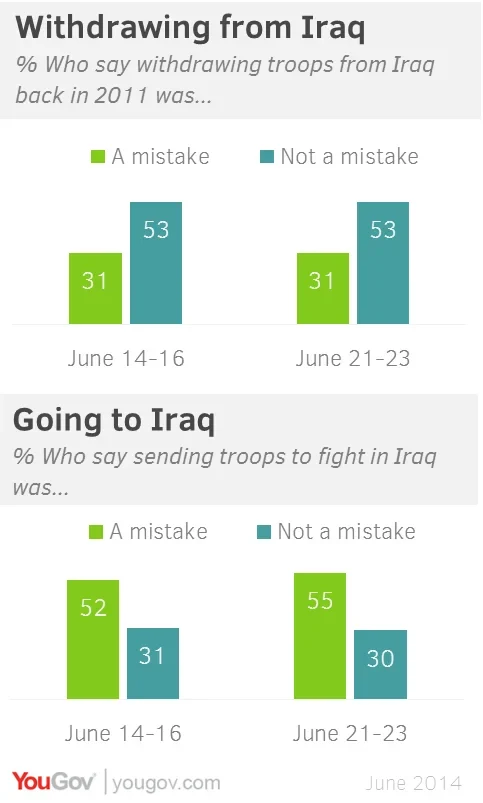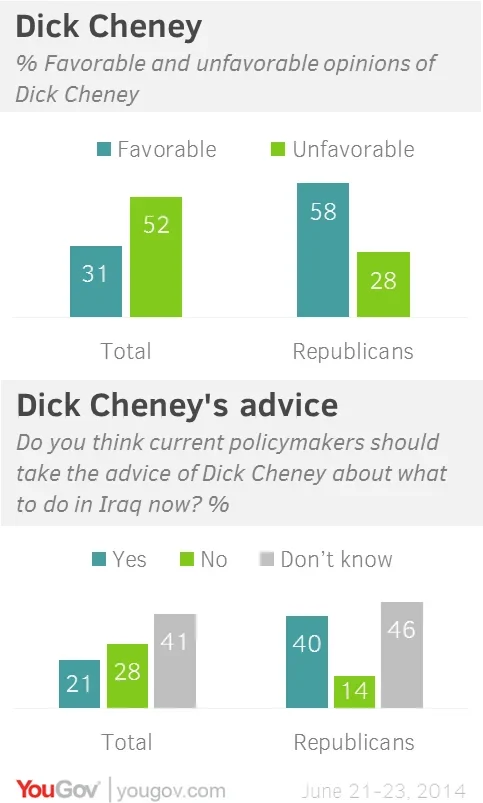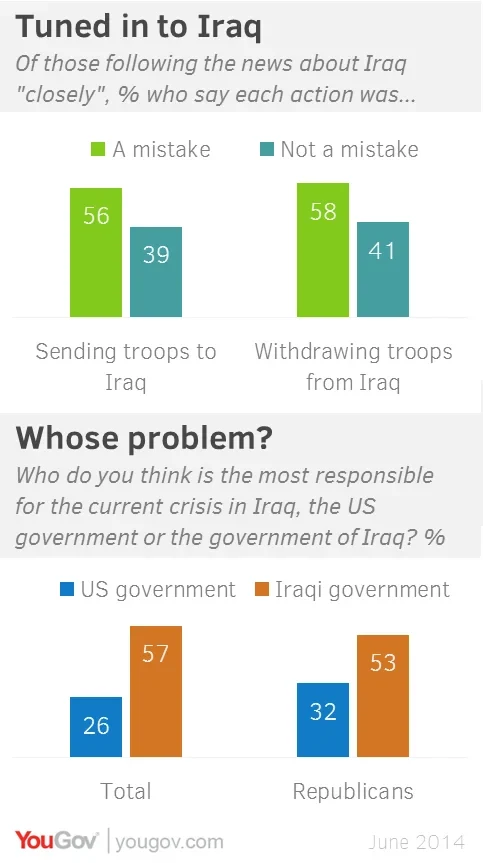This week only 31% agree it was a mistake to withdraw U.S. troops from Iraq – the same as last week – and only 21% think policymakers should take Dick Cheney's advice on the issue
Last week, former Vice President Dick Cheney, along with Liz Cheney, his daughter, wrote a scathing attack in the Wall Street Journal on Obama Administration policy in Iraq and especially on the withdrawal of U.S. troops from that country. In the opinion piece, the Cheneys claimed the President’s actions had increased the threat to U.S. security, and hastened American decline. As they wrote: “Rarely has a U.S. President been so wrong about so much at the expense of so many.”

But according to the latest Economist/YouGov Poll, the Cheney attack changed little in American opinion about Iraq. The percentage of Americans who say the withdrawal of U.S. troops from Iraq was a mistake changed hardly at all after the article. In last week’s poll, 53% said it was not a mistake to withdraw U.S. troops from Iraq, exactly the same percentage as thought so last week.
The mistake, for most Americans, was sending U.S. troops to Iraq in the first place. Majorities both this week and last week, believe that was a mistake. A majority of Republicans agree with Cheney: 53% of them disagree when asked if it was a mistake to send troops to Iraq.
One reason that the Cheney article didn’t change more minds is that the former Vice President isn’t well-liked -- and at least some people aren’t sure his advice should be taken. A majority holds an unfavorable opinion of Cheney; less than a third are favorable. Of course, that opinion is related to a person’s political party. A majority of Republicans are favorable towards Cheney. However, more than one in four of the members of his own party don’t like him.

Consequently, despite Cheney’s long service in government as a U.S. Representative, a Cabinet Member, White House Chief of Staff and Vice President, Americans are more likely to say his advice can be disregarded as to say policymakers should listen to him when it comes to what to do in Iraq now. 21% think policymakers should follow his advice; 38% do not.
Republicans are more willing to pay attention to Cheney’s advice, but more than half of Republicans either disagree or say they aren’t sure. The percentage of Republicans with no opinion on this is higher than the undecided percentages overall.
Latest opinions on Iraq
Two out of three Americans are following news about Iraq closely; 22% are following news very closely. Republicans are more likely than Democrats to be paying attention. But even those most attentive in the public believe that sending troops Iraq was a mistake. But they also think that withdrawing those troops was another error.

As for Cheney’s handling of Iraq, Americans are negative (they also are negative about President Obama’s handling of the situation). By 44% to 30%, they disapprove of the way Cheney handled Iraq; by 49% to 35%, they disapprove of President Obama’s performance. But in the last week, however, there has been little change in assessment of the President, again suggesting that the Cheney critique did not change minds.
But more importantly, Americans view the situation in Iraq as an Iraqi, not a U.S., problem. By more than two to one, they hold the Iraq government responsible for the current crisis. No group gives the United States the most blame: Republicans, who continue to be especially critical of the current President’s management of Iraq, also agree that the current situation is an Iraqi concern, and by a margin only somewhat narrower than that in the country as a whole.
There has also been no appreciable increase in Americans’ willingness to take any action in Iraq. 31% would do nothing (last week, 34% did). Only one in five would send troops to help train Iraqi soldiers and less than a third would support air strikes. Drone strikes remain the most popular option, though only 34% say they would be willing to do even that. Republicans are more willing to take some action, though just 43% of them favor drone strikes. They are not more willing than the public at large to send ground troops in any capacity.
Image: Getty
Full results can be found here.
Economist/YouGov poll archives can be found here.








